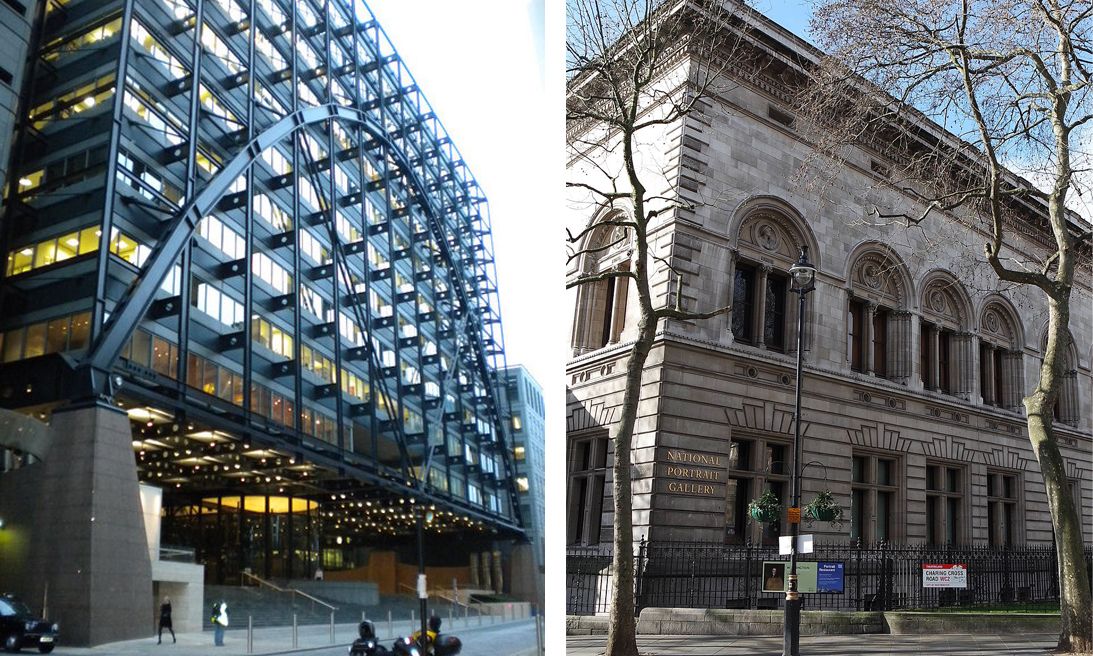"I think you would be hard pressed to find any bank or law firm that didn’t have investments [in energy]": The National Portrait Gallery, London (right) has defended its sponsorship by law firm Herbert Smith Freehills (left)
Photo: Matt Harrop / R Sones via Wikimedia Commons
The National Portrait Gallery in London (NPG) is facing criticism for accepting sponsorship from a law firm, Herbert Smith Freehills, that has represented British Petroleum (BP). Last year the NPG terminated its partnership with BP after more than 30 years, bringing to an end the oil company’s controversial sponsorship of the gallery’s annual Portrait Award. BP had sponsored the prize since 1990.
The prize, for which the winner receives £35,000, will now be known as the Herbert Smith Freehills Portrait Award. The Guardian reports however that Herbert Smith Freehills has an “oil and gas” team whose clients include BP, Chevron and the China National Petroleum Corporation. The company website outlines for instance how the company advised BP on its first major investments in Mauritania and Senegal through a $1bn deal with Kosmos Energy.
A spokesperson for the environmental campaign group XR (Extinction Rebellion) reportedly said: “By taking money from Herbert Smith Freehills, a law firm that advises oil and gas clients, the National Portrait Gallery is helping to clean up the reputation of the lethal fossil fuel industry.” Herbert Smith Freehills were contacted for comment.
A spokesperson for the National Portrait Gallery tells The Art Newspaper that as a charity, part-funded by government, which has to raise 70% of the funds needed to run the gallery, it actively seeks sponsorships and corporate funding to support core activities, including exhibitions and programmes.
“Herbert Smith Freehills have been a longstanding supporter of the gallery for the last 20 years. Their support of the new Herbert Smith Freehills Portrait Award builds on this relationship and will ensure that our prestigious painting competition remains free to visit, while supporting both up and coming and established artists,” the spokesperson adds.
Nicholas Cullinan, NPG director meanwhile told The Times: “I think you would be hard pressed to find any bank or law firm that didn’t have investments [in energy] so I think we just have to be careful because fundraising has always been about turning private wealth into public good and doing that while also acting in the public interest.” He also said that the museum had “red lines” regarding who it would accept money from.
The NPG recently accepted a £10m gift towards its recent Inspiring People redevelopment from the foundation established by the British-American businessman Leonard Blavatnik. To recognise the donation, the Trafalgar Square institution has renamed its first floor the “Blavatnik Wing” where nine galleries have been refurbished.
The NPG reopened in June after the three-year refurbishment which was backed by a raft of sponsors including Herbert Smith Freehills, the Garfield Weston Foundation (whose founder made a fortune in food processing and distribution) and the Ross Foundation (founded by David Ross, the co-founder of telecommunications company Carphone Warehouse). The National Lottery Heritage Fund also contributed.

